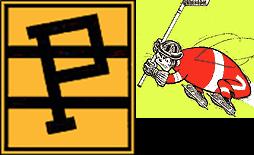|
The Pittsburgh Hornets were minor professional hockey team based in Pittsburgh, Pennsylvania. The team started as the Pittsburgh
Shamrocks in 1935-36 playing home games at the Duquesne Gardens.
The Shamrocks played their only season in the International Hockey League. When the IHL merged into the International-American
Hockey League, the Pittsburgh changed their name to the Hornets for the 1936-37 season.
After four seasons, the I-AHL was renamed the American Hockey League (AHL) in 1940-41. The Hornets played in the AHL until
1955-56, when their arena was in disrepair. Without a sufficient arena, the team moved to Rochester, New York becoming the
Rochester Americans.
A second incarnation of the Hornets played in the AHL from 1961 to 1967, playing home games at the Civic Arena. The Hornets
served as the Toronto Maple Leafs minor league affiliate. The team ceased operations after the 1966-67 season due to the awarding
of a National Hockey League expansion team, the Pittsburgh Penguins, to begin play in 1967-68.
The Pittsburgh Pirates' history traces back to the Pittsburgh Yellow Jackets of the US Amateur Hockey Association. The
Yellow Jackets' owner was a former referee named Roy Schooley. When Schooley encountered financial problems, his team was
purchased by attorney James F. Callahan. Callahan renamed the team the Pittsburgh Pirates, after the name from the baseball
team.
Eddie Livingston was eyeing Pittsburgh as a city for his proposed rival league to the NHL, and Frank Calder negotiated
to put a franchise in Pittsburgh to thwart this.
The US Amateur Hockey Association folded and the Pittsburgh Pirates were granted a franchise by the NHL on November 7,1925
and became the NHL's third US-based team. The other two teams were the Boston Bruins and the New York Americans.
The Pirates first season was in 1926,27 In 36 games, they had an impressive 19 wins, 16 losses, and 1 tie for third best
in the league. With a 0.542 winning percentage, that first season would arguably be the team's best. They made the playoffs
that year but lost in the first round of the quarter finals to the eventual Stanley Cup Champion Montreal Maroons'.
After a good start to their franchise history, things went downhill from there. In five seasons, they were above .500
only twice and made the playoffs only twice. The Pirates' third season (1927-28) was that other season. In 44 games, they
had 19 wins, 17 losses, and 8 ties. But again, would bow out of the playoffs in the first round to the eventual Cup champion
New York Rangers.
The Pittsburgh Pirates have left their mark in the NHL record books and NHL history with many firsts and other notable
achievements.Odie Cleghorn,the Pirates' coach (and occasional player) for the first four seasons, was the first NHL coach
to change his players on the fly. This was an ingenious idea. He was also the first coach to use three set forward lines,
which was a huge change from the standard, which was to simply leave the best players out for as long as possible. The Pirates
also set an NHL record in salaries by signing defencemen Lionel Conacher to a three-year deal worth $7,500 a year.While playing
against the New York Americans on December 26,1926 an NHL record for most shots in one game occurred. The two teams combined
for 141 shots in a 3-1 New York win.Roy Worters made 70 saves for the Pirates and Jake Forbes made 67 saves for the Americans.
That is a record that still stands today.Also, the legendary goaltender Georges Vezina of the Montreal Canadiens played his
last game against the Pirates in a 1-0 loss. Vezina had started the game with severe chest pains and left the game during
the first intermission with a high fever. He died four months later from tuberculosis.
In 1928 financial problems forced the original owner, Callahan, to sell the team to an ownership group which included
Bill Dwyer with fight promoter and ex-lightweight boxing champion, Benny Leonard as his front man. Despite the sale of the
team, things didn't improve on the ice. The 1929-30 season saw Pirates achieve their worst win-loss record to date with 5
wins, 36 losses, and 3 ties in 44 games. Things didn't improve financially either. With the stock market crash of 1929 followed
by the Great Depression, the owners found themselves in financial difficulties. Attendance was down and they tried selling
off their star players to make ends meet. The team was $400,000 in debt by the end of the 1929-30 season. Leonard then decidedto
move the Pittsburgh Pirates to Philadelphia and rename them the Philadelphia Quakers, with the intention of returning to Pittsburgh
as soon as a new arena was built. However, the Quakers had a wretched season in 1930-31, and promptly suspended operations.
The franchise suspended operations each season for the next five seasons. Finally, when a new Pittsburgh arena failed to materialize,
Leonard surrendered his franchise in 1936. As it turned out, a new arena in Pittsburgh wouldn't be built until the Pittsburgh
Civic Arena (now Mellon Arena) opened in 1961.
The last active Pirates player was Cliff Barton, who played his last NHL game in 1940.
|

